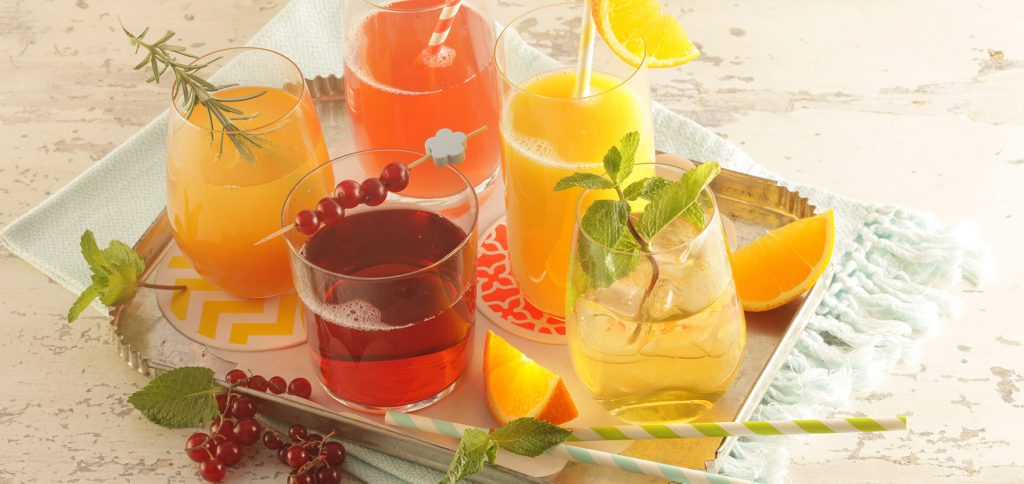World’s first fruit juice sommelier training

In mid-2010, the Zukunftsinstitut (Future Institute) in Kelkheim, Germany identified what it called the “sommelier effect” as one of 50 microtrends. And indeed, there is growing interest in various sommelier training courses, a development confirmed by Dr. Peter Schropp, head of seminars at Doemens Academy. The academy’s latest project is the world’s first fruit juice sommelier training course, held in collaboration with confructa colleg.
If you look at the global market for fruit juices, it’s not really surprising that the fruit juice sommelier training course is being launched in Germany. With per capita consumption of 32 liters of fruit juice and nectar per year in 2017, Germans are the fruit juice world champions. Relatively far behind are Norway (24.8 liters), the Netherlands (22.9 liters), Austria and the U.S. (each 22.6 liters). If you look at per capita consumption of fruit juice and nectar by market region, North America takes the lead with 23.7 liters, according to the AIJN Report (AIJN = European Fruit Juice Association), followed by Western Europe (19.1 liters), the EU 28 (17.9 liters), Eastern Europe (10.7 liters), Latin America (5.8 liters), Africa & Middle East (3.7 liters), and Asia/Pacific (2.2 liters).
Fruit juice sommelier needed: Consumers not very knowledgeable
Considering the Germans’ high consumption of fruit juice and nectar, you would expect them to be well-informed on the subject of juice. However, a recent survey carried out by Nordlight Research on behalf of the German fruit juice industry (VdF) showed that this is not the case: For example, 81 percent of consumers surveyed assume that fruit juice from concentrate contains ingredients other than juice, although juice always means 100 percent fruit. And a surprising 23 percent believed that juice that is not from concentrate (NFC juice) is also not made from 100 percent fruit. Consumers are likewise badly informed when it comes to sugar: In many cases, they did not know that fruit juice contains only the fruit’s natural sugar.
Trend toward variety and high quality
Another interesting fact: the survey showed that consumers of fruit juices and nectars especially appreciate the variety of types and flavors. 73 percent said that they like to drink juice because of the variety. For 69 percent, drinking juice means refreshment, 56 percent reward themselves with a glass of juice, and 47 percent believe that the factor “reviving one’s vital spirits” is important.
The fruit juice industry, retailers and the catering industry can learn one thing in particular from these results: Even if they enjoy these beverages, as the “fruit juice world champions” Germans still have a lot to learn about fruit juices and nectars. In the future, trained fruit juice sommeliers will help inform consumers in detail. Klaus Heitlinger, Managing Director of VdF: “The new training course gives the fruit juice industry the opportunity to present fruit juice as an especially versatile product in terms of enjoyment. The goal is to explain to consumers which juice combines best with specific meals and thus to create new reasons to enjoy juice – both in restaurants and at home.” It also creates new opportunities to strengthen the perception of fruit juice as a high-quality, healthy product – especially since Germans increasingly choose very high-quality premium juices, such as NFC juices and smoothies.
Strong demand for expert knowledge
The fruit juice sommelier training course, which has three modules, looks at the sensory functions as well as examining fruit and vegetable juice production and marketing in depth. One of the goals of the course is to turn participants into real juice experts who know about health aspects of juice as well as the most suitable glass for different juices and the advantages and disadvantages of different production processes.
Dr. Schropp: “It’s a fact that for many years there has been a trend towards non-alcoholic beverages, whether for health reasons or because of limits on alcohol consumption when driving. But the industry has a lot of catching up to do here. This is why at Doemens, we train consumption ambassadors who are able to recommend non-alcoholic alternatives to accompany meals. In this case, we are upholding the motto: ‘Fruit juice is the new wine’ – which, by the way, has been common practice in Scandinavia for some time.”
According to Dr. Schropp, most of the people who have registered for the new training course come directly from the fruit juice industry, which shows that the industry recognizes the potential of training – for instance, when retailers and catering companies are able to give consumers accurate advice about their products. But there have also been registrations from people who have completed other sommelier courses, such as for wine, water, spirits, or beer. Dr. Schropp: “For some time, we have been observing a trend toward completing several sommelier training courses. I think it’s a logical development and one that will increase in the future, especially in catering and among specialized beverage retailers.”
Future scenario: beverage sommeliers
It’s a trend that, basically, has nothing but benefits for consumers. Today, better restaurants generally employ trained wine sommeliers. One possible scenario in the future is that better restaurants employ beverage sommeliers who are able to offer expert advice on fruit juice and water as well as beer, wine, and spirits – in other words, all-rounders with a comprehensive knowledge of beverages. In the future, the practice of drinking a beverage tailored to each course of a meal will make the dining experience more entertaining, exciting, informative, and, ultimately, tastier. And, naturally, consumers also benefit when trained retailers are able to offer sound advice about the beverages they sell. Thus the “future sommelier scenario” means, above all, enhanced expertise and a better image for caterers and specialized retailers, and, as a consequence, increased sales opportunities.
Outstanding forecasts
For the beverage industry, Dr. Schropp hopes that interest in fruit juice sommelier training will continue to grow – ideally, to the same extent as the water sommelier training that Doemens has offered since 2011. Instead of the original one course per year, the academy now offers three German-speaking and at least one English-speaking course per year in this segment. There is also increasing demand for in-house training. If we believe the forecasts from the Zukunftsinstitut, there is a very good chance that interest in the fruit juice sommelier training course will grow steadily. The trade associations also hope that this will be the case. For example, in addition to the VdF, the Bavarian Fruit Juice Industry Association, the Austrian Fruit Juice Industry Association and the Swiss Fruit Association have expressed their support by participating as sponsors.
